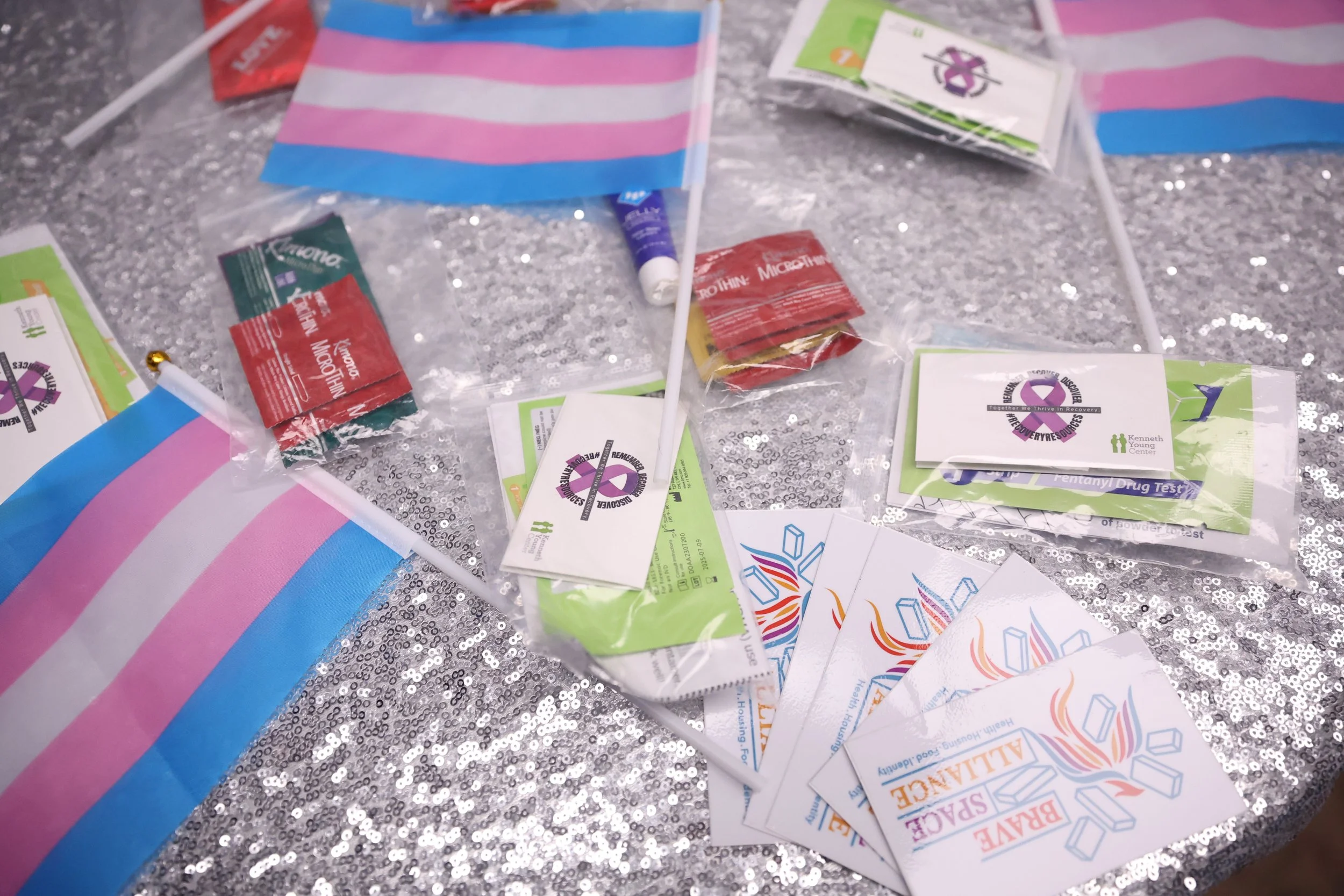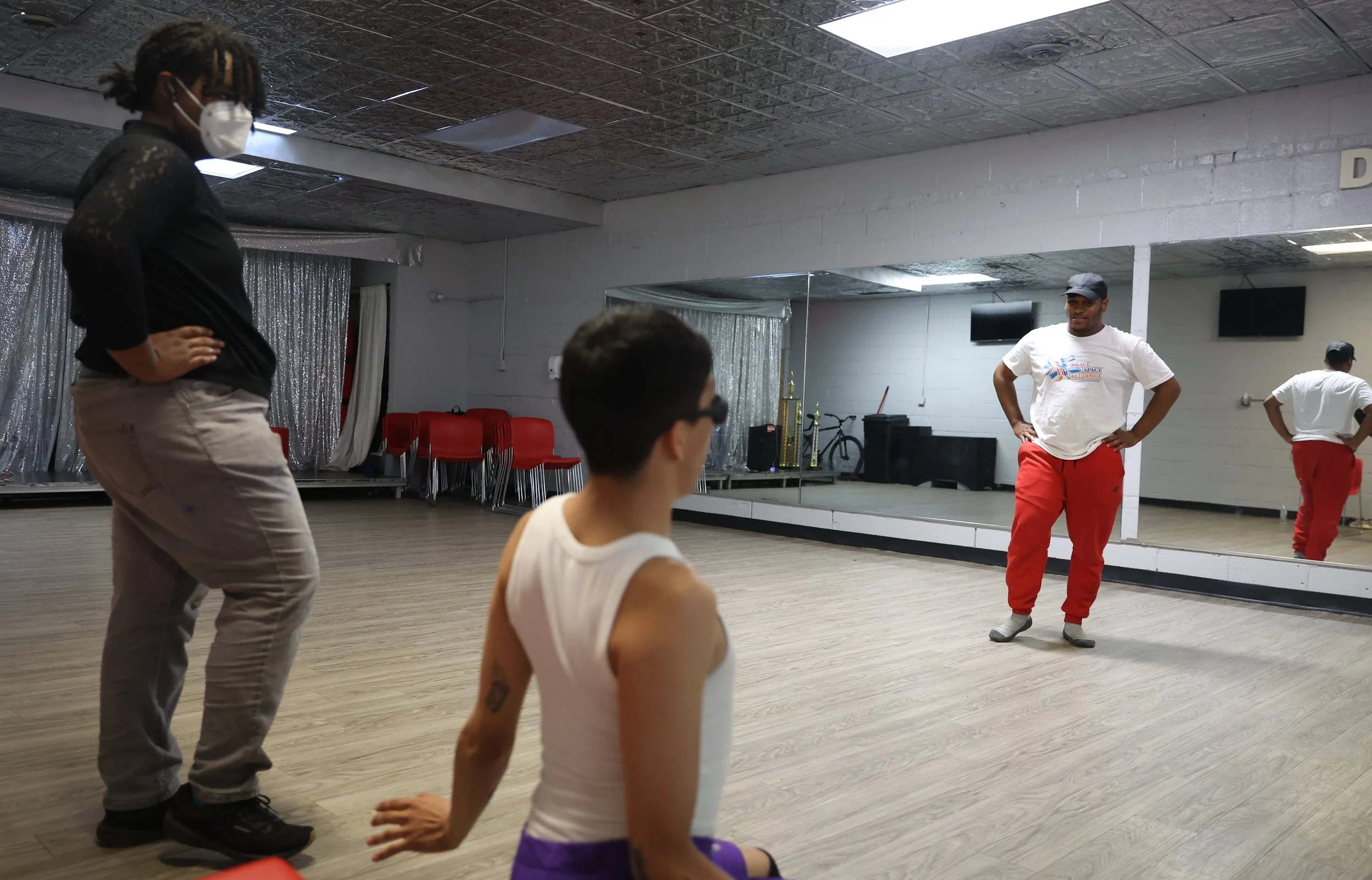Brave Space Alliance's Jahiem Jones discusses the power of holistic support and safe spaces to set young people up for success.
By Robert Speed Jr
Jahiem Jones, Outreach Coordinator for Brave Space Alliance, poses for a portrait during Vogue University at Dance Force Elite dance studios in Ashburn on Thursday, July 17, 2025. (Talia Sprague/for City Bureau)
Jahiem Jones moves through Brave Space Alliance like he belongs there — because he does. The 22-year-old knows every corner of the Hyde Park building: from the common area where participant artwork covers the walls to the back room where he runs "On My Soul," a support group he created.
Brave Space Alliance, a Black- and trans-led LGBTQ+ support center, was founded in 2017 and provides health, housing, food, and identity-affirming services, resources and events.
Two years ago, Jones was looking for services; now, he provides them to other young participants.
Chicago allocates millions to summer youth employment each year, including $50 million with the goal of 29,000 jobs for young people in 2025. Mayor Brandon Johnson recently told The TRiiBE his administration surpassed its goal with over 30,000 jobs.
Yet high jobless rates have persisted among Black youth ages 16-19, with some South and West Side neighborhoods reaching 80% unemployment in 2023, according to a 2025 UIC report. Researchers argue programs such as One Summer Chicago are cost-effective and have short-term benefits, but more investment in and expanded access to summer and year-round opportunities is necessary to address persistent joblessness in under-resourced communities.
That’s where community-based programs can play a key role. Beyond job placement, many emphasize comprehensive support with housing, transportation and cultural identity to create lasting outcomes and opportunities.
Jones found that approach at Brave Space through programs such as Vogue University, integrating HIV testing, safe sex education and financial literacy with dance instruction that affirms LGBTQ+ participants rather than requiring them to conceal their identity for employment readiness.
Jones' progression from Dignity Suite volunteer to creating "On My Soul" to becoming youth outreach coordinator — a role that didn't exist until his expertise created the need for it — illustrates how sustained community infrastructure can create leaders who don't just find opportunity, but build it for others.
This interview has been condensed and edited for clarity.
How did you find Brave Space Alliance?
I started off as a participant. I'm in the ballroom community — the LGBTQ+ cultural scene where chosen families called "houses" provide support and mentorship — so my house parents from the House of Gorgeous Gucci would always hit me up. They had a lot of amazing resources, so I just took advantage of all the resources that day. From there, I just kept coming. I kept getting the resources.
One day, [House Mother] Courtney (senior outreach coordinator at Brave Space) was like, "You come every day. I think you should start volunteering here." So, in my spare time, I would volunteer and interact with the other participants. Then last year, I got a call from Courtney. She was like, "Hey, we have a job opening for you here." The youth outreach coordinator role wasn't developed yet here at Brave Space Alliance. They brought me on as the outreach coordinator, but I pushed for the youth outreach role. As Dr. Mario Pierce, senior director of programs and Father Balenciaga in ballroom would say, "I made the title."
What were you looking for when you came to Brave Space Alliance?
My house parents would always call me up here, saying, "Hey, we have a haircut day. You want to come get a haircut?" I said, OK, cool. The first time I came up here to get the haircut, there were a lot of people, it was a vibe. The music was playing.
Transgender flags and condoms are seen strewn on a table during Vogue University. (Talia Sprague/for City Bureau)
What does Brave Space Alliance provide day-to-day?
We provide essential resources to the community that they can benefit from. Even though we’re mainly a Black-, trans-led organization, we’re still all inclusive, so we service any and everybody from different walks of life.
We have a free food pantry that people can access every two weeks. We provide our Dignity Suite, which is like our personal boutique. We let our trans individuals get their essential needs twice within a week. We have shoes, clothes, hair, makeup, hygiene products — just everyday essential items that people need to survive.
We provide barbershop days every second or fourth Wednesday of every month. We do free women's makeovers, what we call Transformation Tuesdays. We have a drop-in space where our participants come in, cool down, relax, chill out, just kind of hang with us for the day. We help them with resumes. We have a licensed clinical therapist here. We also teach vogue and runway workshops every Thursday at what we call Vogue University.
How does addressing basic needs like housing or food connect to employment readiness?
Most of our participants are unhoused, so just having a warm place to come in the winter, access to food, and someone who genuinely listens — that makes a difference. When we take them in our Dignity Suite, that's kind of like a one-on-one time for us to kind of bond and connect with them and hear their stories. Sometimes there is crying going on, because we're sharing stories back and forth, and we're just hearing each other. And I think that is what makes our participants come back to Brave Space Alliance, because they know that this space here, this is a safe space. You can't focus on a job if you don't know where you're sleeping.
Tzikuri Ramirez, age 29, Faroza, age 25 (left) and Jahiem Jones (right) practice dancing during Vogue University. (Talia Sprague/for City Bureau)
What role does ballroom culture play in your outreach work, and how does that address barriers LGBTQ+ youth face?
Ballroom is family. It's where so many of us find community. A lot of our youth are kicked out by their families over their identity. They're homeless. They're navigating trauma. In mainstream programs, they often face discrimination or feel like they have to hide who they are to be accepted.
We do Vogue University every Thursday, which includes vogue and runway workshops combined with HIV testing, free meals and safe sex kits. It's health embedded within culture. It's art therapy. Here, they don't have to hide who they are. This is a space where they can show up as their full selves and know they'll be supported. It's where our youth are, so it's where we are. People come from all over the city for it. Most of our youth population are normally the main ones coming to Vogue University to learn and teach.
How is Brave Space Alliance different from seasonal programs like One Summer Chicago?
We're here every day; not just for six weeks. Our programs are year-round. We're very good at caring and nurturing our participants. We're very good at understanding them. That emotional support builds trust, and that trust is what brings them back. You can't build that kind of trust in a six-week program.
I always keep in contact with my youth — if I place someone in a workforce program, I call and ask, "How are my kids doing?" That's the big brother in me. And if things don't work out? They can come back, and we try again. That's what makes it a safe space.
Support City Bureau’s Civic Reporting fellowship by becoming a recurring donor.
Check back later to see more of our fellows’ work on youth and summer opportunity.



